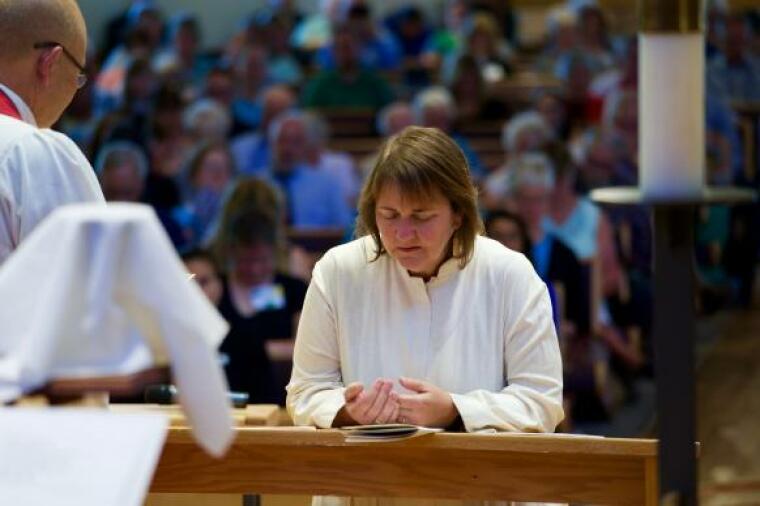Open rebellion: Methodists in West elect lesbian bishop

SCOTTSDALE, Ariz. (Christian Examiner) – United Methodists in the church's Western Jurisdictional Conference have elected their first openly-lesbian bishop in defiance of the church's long-standing teaching that homosexuality is at odds with Scripture and the church's Book of Discipline.
According to the denomination's news service, Rev. Karen Oliveto, 58, senior pastor of Glide Memorial Church in San Francisco, was elected July 15 on the 17th ballot after two other ministers withdrew, neither having sufficient support to secure the post. Another minister, openly-gay Rev. Frank Wulf, also withdrew from the election.
"I think at this moment I have a glimpse of the realm of God," Oliveto said after the election. "I want to thank the candidates who I have journeyed with these past few days, for the grace with which we walked with each other. And know I stand before you because of the work and prayers of so many, especially those saints who yearned to live for this day, who blazed a trail where there was none, who are no longer with us, and yet whose shoulders I stand on."
Oliveto said the church, by her election, had taken a step closer to "perfection."
A retired bishop from the same jurisdiction, Melvin Talbert, said the church had "finally come to the realization that there is no longer any place for exclusion."
"We are all children of God regardless of race, ethnicity, gender, sexual orientation or abilities. We would be blessed to invite all God's people to their rightful place at the table," Talbert said.
But the leadership of the church has recognized that the election of an openly-lesbian bishop will most likely fracture the fragile denomination.
Bishop Bruce R. Ough, president of the UMC's Council of Bishops, said Oliveto's election "raises significant concerns and questions of church polity and unity."
While Ough said the council does not have any authority to intervene in the placement of the bishop, he added theat "being a self-avowed, practicing homosexual is a chargeable offense for any clergyperson in The United Methodist Church, if indeed this is the case."
It is unlikely, however, that the council would recommend any action. Ough said the church would not be well served by a public battle over the issue of the bishop's appointment. Instead, he said, church leaders will continue with the plan to meet to see if the two sides in the debate (one holding to Scripture and one departing from it) can have an amicable reconciliation on the church's teaching on homosexuality.
He expressed hope that the parties remained together.
"Our differences are real and cannot be glossed over, but they are also reconcilable. We are confident God is with us, especially in uncharted times and places. There is a future with hope. We invite your constant and ardent prayers for the witness and unity of The United Methodist Church. May God guide us as we seek to maintain unity in the bond of peace," Ough said.
At the end of June, a group of Methodists dedicated to advancing the cause of inclusiveness for members of the lesbian, gay, bisexual and transgender community in their denomination encouraged the election of as many as three openly gay bishops to help lead the church.
The group, Reconciling Ministries Network (RMN), claims that the time is right for the election of the bishops following the denomination's 2016 General Conference. At the gathering in traditionally liberal Portland, Ore., in May, Methodists voted to table several pieces of legislation that would have changed the denomination's stance on homosexuality.
However, the door was left open to further dialogue when Methodists voted narrowly (428-405) to establish a special commission to study the inclusion of members of the LGBT community as ordained priests and to recommend whether or not the church should bless same-sex marriages.
Homosexual activists have a long history of trying to overturn scriptural teachings on homosexuality in the denomination, but since 1972 church doctrine has regarded homosexuality as "incompatible with Christian teaching."
Some voices spoke in favor of continuing to align the church's practices with that teaching and with the teaching of Scripture.
Rev. Robert Refroe, president of Good News, a group dedicated to upholding biblical teachings on human sexuality, said the decision ignores the teaching of the church.
"If the Western Jurisdiction wanted to push the church to the brink of schism, they could not have found a more certain way of doing so."
The states represented in the western jurisdiction include Alaska, Arizona, California, Colorado, Hawaii, Idaho, Montana, Nevada, Oregon, Utah, Washington and Wyoming.